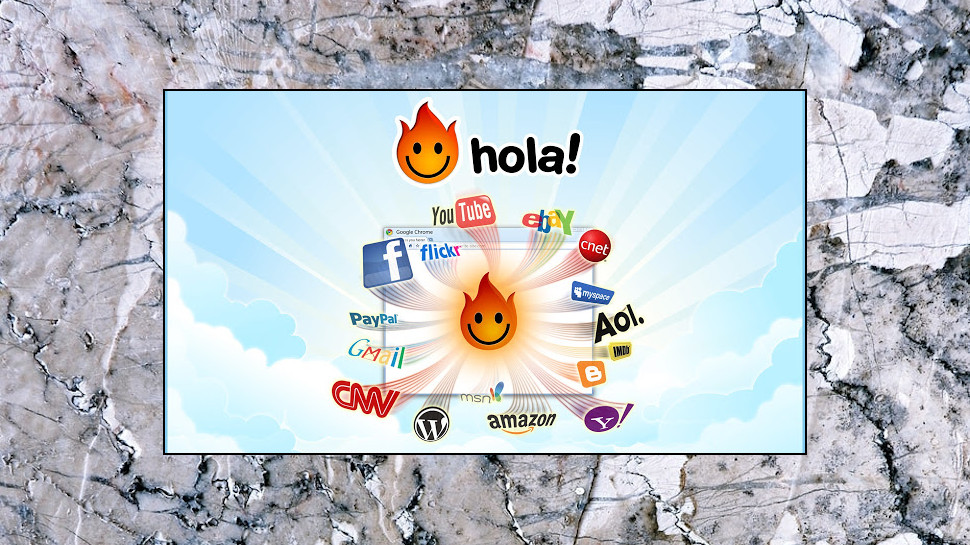TechRadar Verdict
Hola Premium is great at unblocking streaming services, but the paid version is overpriced and the 'free' version isn't entirely free. It's also not the best choice for privacy conscious buyers. In short, there are better VPNs on the market.
Pros
- +
Great at unblocking
- +
Easy to use
- +
Apps for most platforms
Cons
- -
Logs your browsing history
- -
Expensive
- -
Limited features
Why you can trust TechRadar
1. Features
2. Pricing
3. Privacy and security
4. Logging policy
5. Where is Hola based?
6. Performance
7. Netflix and streaming
8. Torrenting
9. Apps
10. Browser extensions
11. Kill switch
12. Customer support
13. Final verdict
14. How we test
Hola VPN claims over 200 million downloads and comes in both 'free' and paid-for 'Premium' flavors. But how does it measure up to the best VPN services out there?
Hola certainly has its upsides – namely its ability to route your browsing through thousands of ordinary devices, making it an excellent choice for unblocking streaming services such as Netflix.
However, it also has plenty of downsides, including its lack of features (no P2P support) and a deeply unsatisfactory no logging policy. Oh, and the 'free' version isn't really free...
Undecided about Hola? You've come to the right place. I've reviewed literally hundreds of VPNs over the last 15 years, including the best free VPNs, using real-world testing to cut through the marketing hype and deliver an accurate evaluation.
Below, you'll find my full and frank Hola VPN review – no punches pulled.
▶ Save 49% on ExpressVPN – our #1 rated VPN
Hola VPN features
Hola is different to most regular VPNs – the Israeli company calls it a "community powered (Peer-to-Peer) VPN". You'll get to choose a destination country, but Hola routes your traffic through other users' computers, rather than its own network.
The upshot of this is that Hola is much more limited than regular VPNs – no P2P support, no dedicated IPs, no port forwarding – and its technology has all kinds of potential performance issues. However, there are some possible benefits. For example, as your traffic will always be taking different routes, depending on the available systems, it should make it more difficult to be detected and blocked.
As such, Hola VPN is very good at unblocking streaming services such as Netflix, Disney Plus, BBC iPlayer, Channel 4, 9Now and many more besides.
One obvious concern is that although you get to use the bandwidth of other Hola nodes, they can also use yours. But Hola points out that its demands are low, no more than 3MB a day from mobile devices, 100MB from desktops.
Additionally, Hola only uses a system as a peer if it's completely idle and not running on battery power, ensuring it shouldn't make any noticeable difference to the operation of your device.
If you don't want to be part of the peer-to-peer network, you can opt out by subscribing to the 'Premium' version. It's also worth noting that the Hola browser extensions (Chrome, Opera, etc) and Hola Apps (iOS, Android) are not part of the peer-to-peer network.
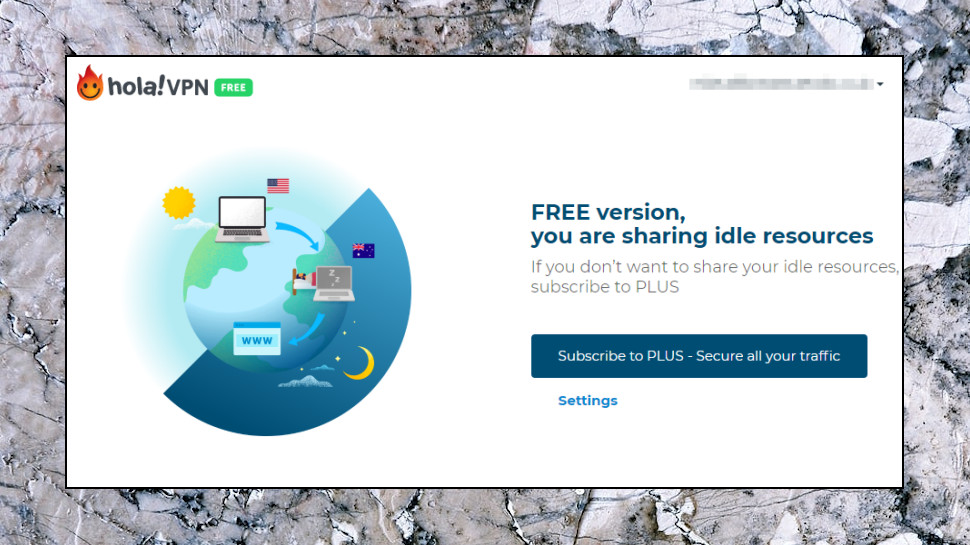
Hola VPN pricing
Hola is available in a free plan, but this has many issues. It allows others to use your bandwidth, displays regular popups while you're connected, and limits the usage you can make of the service each day.
Uncomfortable with that? Then we'd really recommend you sign up with a real VPN, but if for some reason you're keen on Hola, you can also upgrade to Hola Premium.
The service supports Windows, Mac, iOS and some Android devices, and can be set up to run on routers, gaming consoles, smart TVs and more. Hola Premium allows you to connect up to 10 of these devices simultaneously, and as you're a paying customer, no one else will be able to use your bandwidth.
Prices start high at $14.99 billed monthly, or an equivalent $7.69 on the annual plan. You could sign up with ExpressVPN, a vastly superior service which actually will protect your privacy, and pay less ($12.95 monthly, or $6.67 on the annual plan).
Hola's pricing is designed to push you to the three-year plan, though, which is far cheaper at $2.99 a month. That's good value, but again, you can get far better VPNs.
The excellent Private Internet Access gives you three years plus three free months for $2.03 a month, for example. That translates to 39 months of coverage for $79, while Hola offers 36 months for $107.55.
Hola used to offer an Ultra plan, which allowed for connecting up to 20 devices and 4K streaming. Prices were eye-watering: $29.99 billed monthly, or $19.99 on the annual plan. We could find not trace of the Ultra plan on Hola's website, however. Again, if you want support for unlimited devices and 4K streaming, Private Internet Access offers all that and more for less.
If you do decide to sign up, Hola's payment options include credit card, PayPal, Google Pay, AliPay and more. There is no option to further protect your privacy by paying in Bitcoin, which is disappointing.
Hola has a money-back guarantee, but beware, this only applies if you've never made a single Hola Premium connection, and you make your claim within 14 days of purchase. Hola argues that this is to 'protect itself from fraud', but that doesn't stack up given that most other VPNs allow you to use their service for up to 30 days and still claim a full refund if you're not 100% satisfied.
The Billing and Payments section of the Hola VPN website provides a link to "cancel your subscription and future payments". However, the link redirects to the home page, which isn't a huge help. If you are seeking to cancel Hola Premium, here is the correct link.
Privacy and security
Hola protects your web traffic using the IKEv2 VPN protocol by default, but the Hola site says that in the case of free users, apps such as the Windows desktop app can fall back to the older PPTP/L2TP protocols if IKEv2 won't connect.
This gets you AES-256 encryption with relatively basic SHA1 integrity checks. Hola's Windows app allowed us to customize encryption settings, so you can switch to SHA256 or SHA384, for instance. But the app also offers some very poor choices, including MD5 hashing and DES3 encryption, a near 50-year-old protocol which is so vulnerable to attack that NIST says it should no longer be used. (You don't have to select these, but there's always a chance someone might do so by accident, and we're struggling to see why they're on the list at all.)
Although Hola's default encryption settings are enough to, say, shield your web traffic on public Wi-Fi, they can't match the security you'll get with the top VPN competitions. Most providers use leading edge protocols such as OpenVPN or WireGuard, for instance. PPTP and L2TP are so insecure that the bulk of the industry dropped them long, long ago, and although IKEv2 isn't a bad option, it's also on the way out. (NordVPN began removing IKEv2 support in June 2023, for instance, as it doesn't offer the best security.)
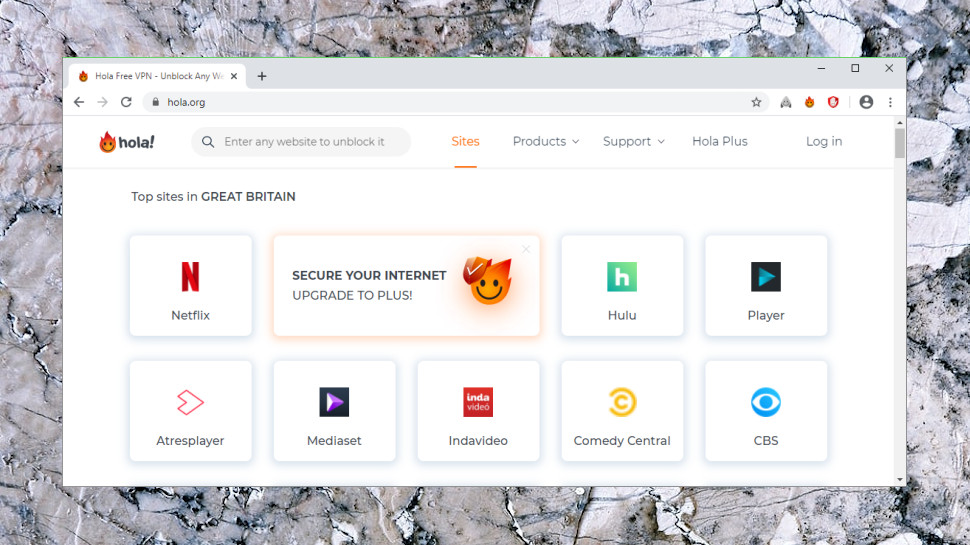
Logging policy
In theory, signing up with a VPN can be a great way to shield your browsing from snoopers.
In practice, there's a problem. Sure, using a VPN prevents your ISP from tracking what you're doing, but it also gives your provider a perfect chance to do the same. That's why it's important to check that your chosen VPN doesn't log any of your online activities.
I took a look at Hola's Privacy Policy – last updated September 7, 2022 – and quickly realized this is as far away from a 'no log' VPN as it's possible to get.
When you use the service, for example, the policy says Hola might log your IP address, operating system, browser type, the web pages you visit, when you arrive, and how much time you spend on each one.
If this is a mobile device, Hola also makes a careful note of all your installed apps.
Hola says it doesn't 'rent or sell any Personal Information', but that's not as reassuring as it sounds. The company also says it may share Personal Information with 'subsidiaries' and 'affiliated companies.' Even if Hola doesn't rent or sell your data, that doesn't tell you what these other companies might be doing with it.
There's another potential catch. In data protection terms, "Personal Information" refers to items that identify an individual, so Hola is telling us that it won't sell user contact details. Your browsing history isn’t necessarily 'Personal Information', though, and there's nothing here that says Hola can't sell it, or "share" it with an "affiliated company" for some other purpose.
It gets worse (no, really). Hola says it may also share your Personal Information and other data to comply with legal requests or to detect fraud or violations of its policies. So not only might the company hand your browsing history over if the authorities ask, but it also reserves the right to analyze it for potential 'violations.'
Still in any doubt? Compare the Chrome Store 'Privacy practices' page for NordVPN and Hola. The NordVPN page says it will not collect or use your data. Hola's says it collects personally identifiable information, financial and payment information, authentication information, personal communications, location, web history, and user activity.
Put it all together, and if you care at all about privacy, Hola is clearly not the service for you. Check out the best free VPNs for far more trustworthy providers who'll genuinely protect your privacy rather than compromise it.
Where is Hola VPN based?
Hola VPN is based in Israel, which isn’t officially a member of the 5, 9, or 14 Eyes intelligence-sharing alliances. That said, Israel is widely recognized as ‘close ally’ of the 14 Eyes alliance, which would suggest some level of cooperation.
When you throw Hola’s relatively basic security and inadequate no logging policy into the mix, you can understand why I believe there is the potential for Israel – or indeed one of its intelligence partners – to surveil your internet usage.
Israel might have developed some of the world’s finest encryption technology but anyone serious privacy should give Hola a miss and opt for an independently-audited service such as ExpressVPN.
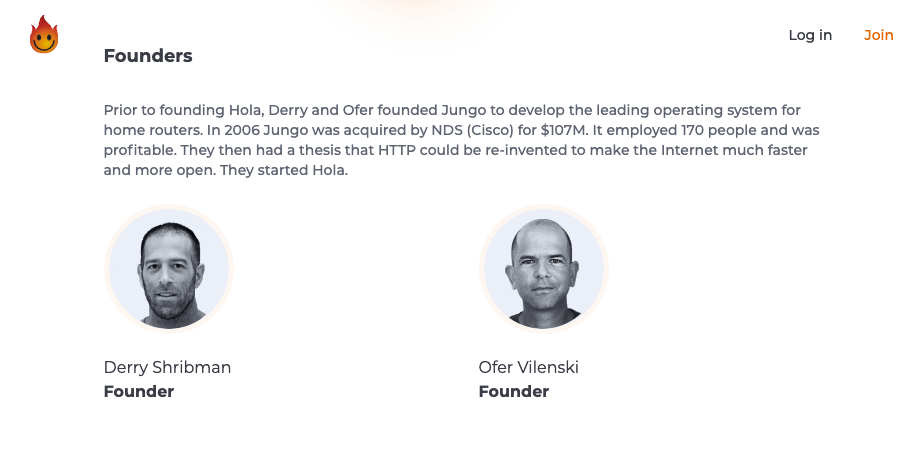
Hola VPN performance
I measured Hola performance with several benchmarking services – SpeedTest's website and command line app, SpeedOfme, nPerf – from a US residential location and UK data center, both with a 1 Gbps connection. Each test is run multiple times across a couple of sessions, providing me with more than 100 data points.
After crunching the numbers, the results were below average, with Hola's median speeds reaching 200-260 Mbps at best.
That's roughly equivalent to the OpenVPN speeds we'll see from some providers. CyberGhost's OpenVPN connections, for example, reached 360 Mbps in recent testing, which puts Hola to shame.
WireGuard or similar protocols can be much faster. For example, NordVPN and Surfshark all reached over 950 Mbps in their most recent tests.
Using the free version? Hola's download speeds averaged around 180 Mbps to 240 Mbps, more or less what we'd expect for an IKEv2 connection. So, nothing special – but enough for browsing, streaming and basic web tasks.
Netflix and global stream unblocking
Hola sells itself mostly on the ability to unblock top websites, especially Netflix and other streaming platforms.
I found Hola's free browser extension successfully unblocked Netflix libraries in the US, UK, Australia, Canada, and Japan.
Hola Premium works a little differently, so I ran some extra tests. It also allowed me to view exclusive Netflix content in the US, UK, Canada, and Japan, and with Australia on its second try (having to retry is a hassle, but as long as a service is unblocked at least once in three connections, we count it as a pass.)
The app offers easy access to a couple of other top US platforms in Disney Plus and Amazon Prime Video. It worked with regional sites including Australia's 9Now and 10 Play, and the UK's BBC iPlayer, ITV, and Channel 4.
That's an excellent set of results, but some other services are just as effective. Private Internet Access also unblocked 100% of our test streaming platforms when we last checked, for instance, for a fraction of the cost of Hola Premium.
ExpressVPN also unblocks (almost) everything. And, unlike most VPNs, it proactively monitors and improves its unblocking performance.
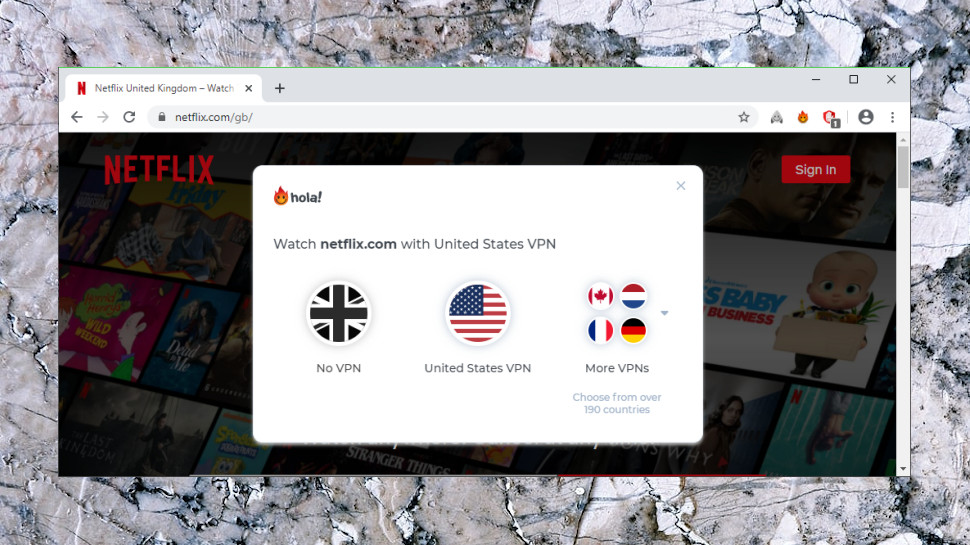
Hola VPN torrenting capability
Hola VPN does not permit torrenting – not even if you subscribe the Premium plan. The FAQ section of its website is crystal clear: "The use of torrent apps on our network is not allowed, and we are blocking torrents traffic."
Although, even if Hola did allow torrenting, the lack of privacy would be extremely worrying, to put it politely.
If you are seeking the best VPN for torrenting, there's plenty of options... but Hola isn’t one of them.
Hola VPN apps
Hola has apps for Windows, Mac, and iOS devices, but the Android situation is more uncertain. Hola has apps available on the Samsung Galaxy and Huawei stores, but not Google Play.
I also found a 'Hola Browser’ app on Google Play which has nothing to do with Hola VPN. To avoid any confusion, download apps directly from the setup links on Hola's website, and if you're using Android, install the Chrome extension instead.
Hola's mobile and desktop apps (stripped-down versions of Chromium) have a plain but very familiar interface: a big On/ Off button, a list of locations underneath, and a handful of icons for tasks such as managing your account or tweaking a few settings. If you've used another VPN app you'll figure it out immediately and even if you're a total VPN newbie, it'll only take a minute or two.
One of the reasons the apps are so straightforward is they have almost no features. The 'Location' menu is a simple list of countries with a search box; no server load information, no ping times, no recent locations list, no sort option , no favorites system, no 'right-click a Hola icon and choose a country' option.
Sometimes Windows VPN apps hide useful features away in a settings menu, but Hola's options are relatively basic. There's the usual 'launch with Windows' and 'automatically connect' settings; an App Kill Switch to close specific apps if the VPN unexpectedly drops, and some largely unnecessary encryption options, but that's about it. If you're hoping for split tunneling, 'auto-connect on accessing Wi-Fi', ad blocking, DNS tweaks, or anything similar, then prepare for disappointment.
Simplicity can work if what you get works well, but that's not the case here. The app took an average of 15 seconds to connect, for instance; that would quickly wear down our patience, especially when ExpressVPN's Windows app took around one second on the same system.
Occasionally the app didn't connect at all, displaying a cryptic 'internal authentication error' message, along with what looked like a clickable 'try again' link (although clicking this did nothing.) I found a 'Fix connection' menu option that fixed these connection issues, which is better than nothing, although I struggle to see why the app didn't automatically use that when its initial connection failed.
Overall, the Hola VPN apps are far more basic and far less professional than most of the VPN competition. Even if you just want to connect to your nearest server and do nothing else at all, there are many far better and more reliable options on planet VPN.
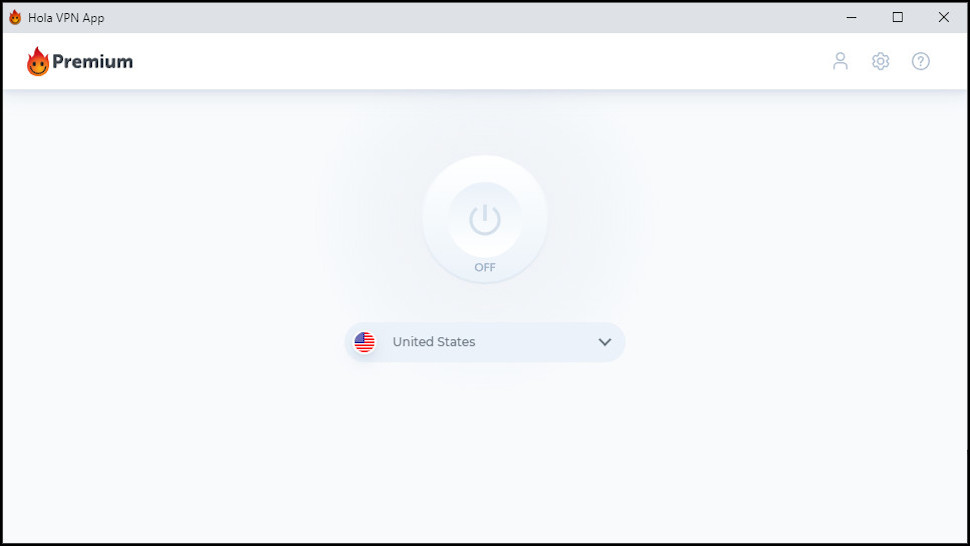
Hola VPN browser extensions
The simplest way to sample Hola is via its Chrome, Opera or Edge browser extensions. Hand over your email address to create a free account, and you can begin unblocking sites immediately.
The extension is very easy to use. Tap a shortcut to common destinations such as Netflix, or enter the domain you'd like to unblock, and Hola connects and takes you there immediately.
This worked well for us, and we managed to view exclusive Netflix content in the US, Australia, and Canada from our UK location.
The free version has some annoyances and limitations. It popped up alerts every 10 minutes, for instance. After 30 minutes, I also had to wait for a 60-second countdown. There's also a limit on your daily usage, although this doesn't appear to be fixed. Many reports say you can only use the service for an hour, but Hola doesn't give a figure, and I made it to around 75 minutes before the clock ran out.
Still, if you've a quick and easy task in mind – e.g. checking Facebook in a country where it's blocked – and you don't required total privacy, then Hola is one of the more reliable free ways to make that happen.
DNS leak and kill switch tests
A VPN must shield all your traffic from snoopers, and in part that means directing all your DNS queries (the requests which translate domains like techradar.com to IP addresses) through the VPN's encrypted tunnel.
We checked Hola for problems with DNSLeakTest.com, DNSLeak.com, IPLeak.net, and others, but none of them spotted any DNS, WebRTC or other leaks.
Hola's Windows app includes an application kill switch to close specified apps if it detects the connection has dropped. You could get Hola to close your browser if the VPN failed, for instance, to reduce the chance that your browsing might be unprotected.
Although this approach has some value, we prefer the full system kill switch you'll get with most VPNs. If Surfshark's connection drops, for instance, its kill switch automatically blocks all internet activity on your device, without you having to manually specify every possible process with a network connection (a very good idea, because there are way more than you think).
To test this, we added an app to the kill switch, connected to Hola, and then turned our router off and on to simulate a network failure. The app didn't react for more than a minute, then switched its display to show that the VPN was off. It didn't raise a notification to warn us, though, and the kill switch had no effect, either: our target app continued to run as normal.
We tried manually closing Hola's connection, instead. The app reconnected, but the lengthy connection time meant our traffic could be unprotected for several seconds.
We expect a decent VPN app to at least display a notification when it spots the disconnect, then tell us that it's redialling, and when the connection is established. Hola's Windows app just displayed its status as 'On' at all times, with no alerts or notifications to tell us when we were (or were not) protected. And again, despite the service reconnecting (so it must have known the VPN had dropped), the app kill switch had no effect.
While this doesn't prove the kill switch is entirely useless - maybe it activates in other situations that we didn't test - it's still a very poor performance overall. A simple notification if the connection drops would at least allow the user to stop what they were doing, if necessary, but the app couldn't even manage that.
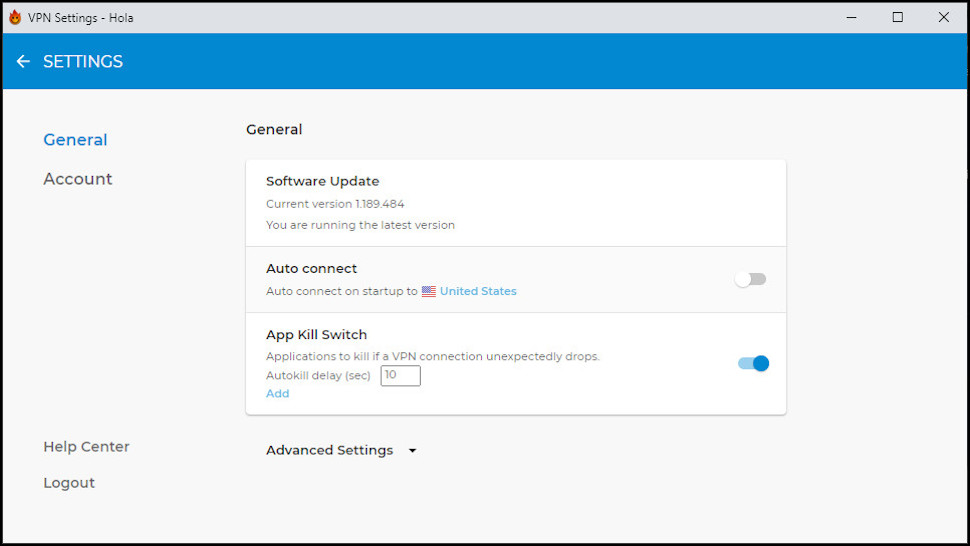
Hola VPN customer support
If Hola doesn't work for you, there are a couple of ways to get some help and advice.
Hola's web-based Help Center is a searchable support site with articles on installation, troubleshooting, billing, and more.
There's a lot of information on offer. The Setup Guide area has sections for 11 platforms, for instance, many with step-by-step advice on how to get Hola running.
There’s no live chat, but paying customers can contact Hola's support team via email (free users are stuck with the website, unfortunately).
I fired off a message explaining that my Windows app kill switch didn't work, I'd uninstalled and reinstalled with no change, and asked what to try next.
A reply arrived about eight hours later. That's a reasonable response time, but the reply wasn't the best. Instead of simply accepting what I said or sounding apologetic, the agent began: "I have tested the app kill switch and it works as it should." Saying to a customer who has a problem, "Well it works for me," is never going to create the best impression.
Still, I was intrigued. I responded "How did you test the kill switch?" hoping to get help improving our own tests. But, for some reason, the agent didn't want to explain exactly what he had done, and four days and no reply later, I finally gave up.
If you want to speak to a real human being in real time, try Nord VPN. I got a friendly response from its 24/7 live chat within a couple of minutes.
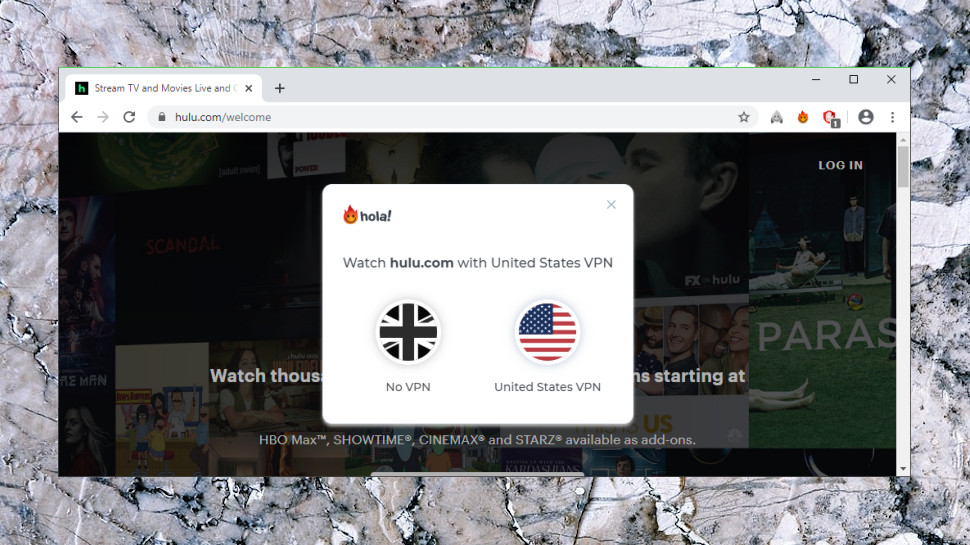
Hola VPN review: final verdict
Yes, Hola can unblock most websites, but at what cost? The free version requires you to share your IP address, bandwidth and browsing history with the company (and who knows else), while the Premium edition charges 2-3 times as much as some top providers, yet still has more logging than almost anyone else. Run (don't walk) to our best VPN list and choose a provider who will care about your privacy, rather than trash it.
TechRadar rating: ⭐⭐
Subscribe if:
✔️ You want a VPN that unblocks like a pro: From major streaming services such as Netflix and Disney Plus, to regional news outlets, Hola VPN can be relied upon to unblock the majority of websites.
✔️ You want a VPN that is easy to use: While more advanced users will find Hola VPN to be horribly underpowered, its lack of features does make it easy to get to grips with.
Don't subscribe if:
❌ You value your privacy or personal information: Even if you get the Premium version and opt out of the peer-to-peer network, Hola admits it may share your personal data to "comply" with the law.
❌ You want support for torrenting, dedicated IPs, or port forwarding: Hola VPN is not like a regular VPN, and features are extremely limited. There are sleeker, smarter VPNs.
❌ You want excellent customer support or live chat: Sure, Hola VPN responded to our email query within a day, but the reply wasn’t anywhere near as helpful as it should have been.
❌ You want an affordable VPN: The Premium edition is downright expensive. The likes of ExpressVPN and Surfshark offer a far better blend of speed, privacy and features for the money.
How we test VPNs
Besides using the top recommended VPNs for our daily activities, we also conduct a thorough analysis of the top 30 VPN services every six months to keep track on how the software compares with other providers as new developments come in.
We start by reviewing each provider's website to double check if its claims and offering changed. We also look for any tracking cookies on the site and if/when they activate to see if the service tracks people using the site.
We then install and use each VPN service across a wide range of location servers and devices to see how they perform across the board. We go through all the settings to make sure all the features work as promised, while playing around with encryption protocols.
Our reviewers actively challenge the software, too, in the lookout for any flaws. For example, we purposely make the VPN connection drop so that we can test if the kill switch does its job of preventing data leaks correctly.
From speed connections and streaming unlocking results, to customer support and app usability, we regularly make sure to test every aspect of the software that could affect the experience of our readers.
As issues arise during our testing, we make sure to investigate these even by digging into the source code or the contents of its RAM if necessary. Head to our dedicated VPN testing methodology page if you want to know more.

Mike is a lead security reviewer at Future, where he stress-tests VPNs, antivirus and more to find out which services are sure to keep you safe, and which are best avoided. Mike began his career as a lead software developer in the engineering world, where his creations were used by big-name companies from Rolls Royce to British Nuclear Fuels and British Aerospace. The early PC viruses caught Mike's attention, and he developed an interest in analyzing malware, and learning the low-level technical details of how Windows and network security work under the hood.
